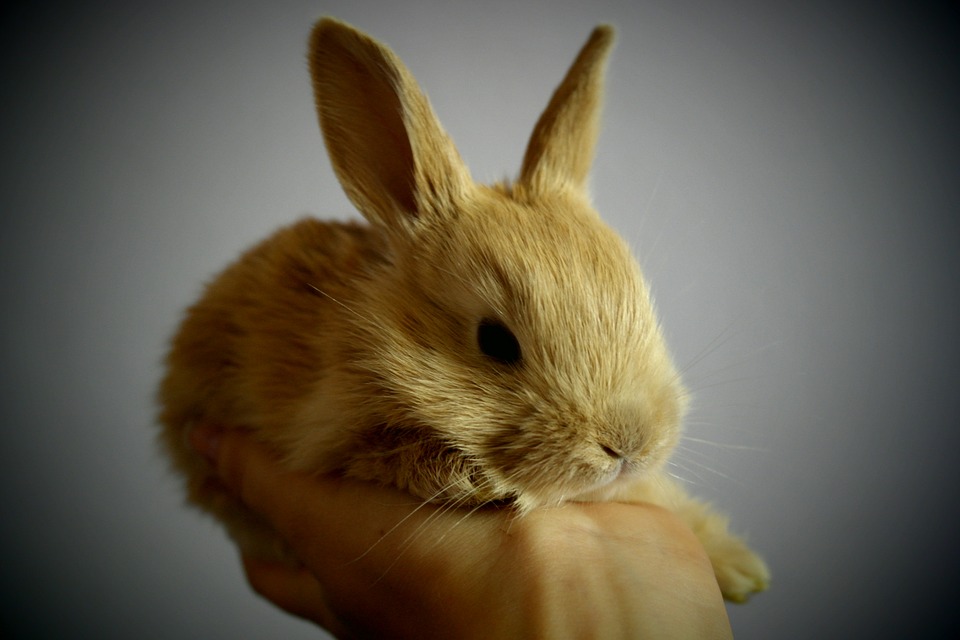This comprehensive article explores the possibility of rabbits contracting fleas from dogs, delving into the complexities of flea transmission, the specific risks to rabbits, and the most effective prevention and treatment methods.
Part 1: Unraveling the World of Fleas

1.1 Flea Basics: Tiny Parasites with Big Impact
Fleas are wingless, parasitic insects that thrive on the blood of their hosts. These tiny creatures are highly adaptable and can survive in a variety of environments, making them a constant threat to both indoor and outdoor pets.
1.2 The Life Cycle of a Flea: A Complex Journey
Fleas undergo a fascinating four-stage life cycle that involves a complex interplay between the host and the environment:
- Egg Stage: Adult fleas lay tiny, white eggs that are often deposited in the host's bedding, carpets, or other areas where the host rests.
- Larva Stage: Flea eggs hatch into tiny, worm-like larvae that feed on organic debris, including flea feces. They are typically found in dark, humid environments.
- Pupa Stage: Larvae transform into pupae, forming protective cocoons that can remain dormant for weeks or even months. This stage is often triggered by environmental cues, such as vibrations or changes in temperature.
- Adult Stage: Finally, adult fleas emerge from the pupae and seek a suitable host to feed on. This is the stage where they are most noticeable and can cause significant discomfort to pets.
Part 2: Exploring Flea Species and Host Preferences

2.1 Cat Fleas: The Most Common Culprit
The cat flea (Ctenocephalides felis) is the most prevalent flea species worldwide and can readily infest dogs, rabbits, and humans. Their adaptability makes them a significant threat to various animal species.
2.2 Dog Fleas: A Close Second
Dog fleas (Ctenocephalides canis) are another common species that primarily target dogs. However, they can also infest cats, rabbits, and humans, posing a potential risk for cross-contamination.
2.3 Rabbit Fleas: Highly Specialized and Host-Specific
Rabbit fleas (Spilopsyllus cuniculi) are uniquely adapted to rabbits, with specific adaptations for their fur, skin, and blood type. They are rarely found on other animals.
Part 3: Can Rabbits Get Fleas from Dogs? Examining Transmission Possibilities
3.1 Direct Contact: The Most Common Route
Direct contact between a dog with fleas and a rabbit is the primary mode of transmission. This can occur through close proximity, playing together, or sharing bedding.
3.2 Indirect Contact: The Environment Plays a Role
Fleas can also be transmitted indirectly through contaminated environments. Flea eggs, larvae, and pupae can survive in the environment for extended periods and readily infest rabbits that come into contact with them.
3.3 Flea Preferences and Host Specificity: A Key Factor
While cat and dog fleas can feed on rabbits, they are not ideal hosts. Rabbit fleas are the most adapted to rabbits and are more likely to establish a successful infestation.
3.4 Factors Influencing Transmission: Understanding the Risks
Several factors can influence the likelihood of a rabbit getting fleas from a dog:
- Flea Population Size: A heavy infestation on the dog increases the risk of transmission to the rabbit.
- Frequency of Contact: Regular close contact between the dog and rabbit significantly increases the chances of flea transfer.
- Environmental Contamination: An infested dog can contaminate the environment with flea eggs, larvae, and pupae, which can then infest the rabbit.
- Host Specificity: The presence of rabbit fleas (Spilopsyllus cuniculi) on the dog is a strong indicator of potential transmission to the rabbit.
Part 4: The Dangers of Flea Infestations in Rabbits
4.1 Skin Irritation and Allergic Reactions: A Common Problem
Flea bites can cause skin irritation, itching, and redness in rabbits. Some rabbits may develop allergic reactions to flea saliva, resulting in severe skin inflammation, hair loss, and scabbing.
4.2 Transmission of Diseases: A Rare but Serious Risk
While uncommon, fleas can transmit diseases to rabbits. Some potential diseases include:
- Myxomatosis: A viral disease transmitted by fleas, mosquitoes, and other biting insects, causing swelling and lesions on the skin and mucous membranes.
- Rabbit Haemorrhagic Disease (RHD): A highly contagious and often fatal viral disease transmitted through contact with infected animals or contaminated environments.
- Tularemia: A bacterial disease spread by ticks, fleas, and other biting insects, causing fever, swollen lymph nodes, and ulcerations.
4.3 Anemia: A Potential Consequence of Severe Infestations
Severe flea infestations can lead to anemia in rabbits due to blood loss. Anemia can cause weakness, lethargy, pale gums, and other health complications.
4.4 Stress and Secondary Infections: A Vicious Cycle
Constant itching and scratching from fleas can cause stress, making rabbits more susceptible to secondary infections from bacteria or fungi. These infections can further exacerbate the severity of the flea infestation.
Part 5: Effective Prevention Strategies for Rabbits
5.1 Regular Flea Control on Dogs: A Crucial First Step
Treating dogs regularly with flea medications, such as spot-on treatments, oral medications, or flea collars, is crucial for preventing flea infestations in rabbits.
5.2 Environmental Control: Minimizing Flea Breeding Grounds
Maintaining a clean and flea-free environment is essential. This includes:
- Vacuuming Regularly: Vacuuming carpets, rugs, and furniture regularly to remove flea eggs, larvae, and pupae.
- Washing Bedding and Toys: Wash bedding and toys in hot water to kill fleas and their eggs.
- Using Flea Sprays or Foggers: Use vet-approved flea sprays or foggers in the environment to kill fleas and prevent infestations.
5.3 Isolation: Preventing Spread and Cross-Contamination
Isolate rabbits suspected of having fleas from other rabbits to prevent the spread of the infestation.
5.4 Rabbit-Specific Flea Prevention: Tailoring Treatments to Your Pet
Consult with a veterinarian about rabbit-specific flea treatments, such as spot-on treatments, oral medications, or shampoos.
Part 6: Managing Flea Infestations in Rabbits: Treatment Options
6.1 Flea Combs: A Simple and Effective Method
Use a fine-toothed flea comb to remove adult fleas and eggs from the rabbit's fur. This method can be used in conjunction with other treatments.
6.2 Medicated Shampoos: Targeting Fleas and Soothe Skin
Vet-approved medicated shampoos can help kill fleas and soothe irritated skin. Follow your veterinarian's instructions carefully when using these products.
6.3 Oral Medications: Effective and Convenient Treatment
Oral flea medications are available for rabbits and can effectively kill fleas within their lifecycle.
6.4 Spot-On Treatments: Long-Lasting Protection
Spot-on treatments are applied to the rabbit's skin and can provide long-lasting protection against fleas. Follow your veterinarian's instructions carefully for proper application and dosage.
6.5 Veterinary Consultation: Essential for Effective Treatment
Consult with a veterinarian immediately if your rabbit shows signs of a flea infestation. They can diagnose the infestation, recommend the most appropriate treatment, and address any underlying health concerns.
Part 7: Addressing Common Concerns
7.1 Can rabbits get fleas from other rabbits?
Yes, rabbits can contract fleas from other rabbits, particularly through direct contact or sharing bedding.
7.2 What should I do if I find flea droppings on my rabbit?
If you find flea droppings (small, black specks) on your rabbit, it is a strong indication of an infestation. Consult with your veterinarian about the best course of treatment.
7.3 Are there natural remedies for fleas in rabbits?
Some natural remedies for fleas in rabbits are available, but it is important to consult with a veterinarian before using them. They can provide guidance on safe and effective methods.
7.4 Can fleas live on humans?
While fleas are not typically permanent residents of humans, they can bite and cause discomfort. Fleas can also spread diseases to humans, making it essential to control infestations in pets.
7.5 Can flea infestations in rabbits be prevented?
Yes, flea infestations in rabbits can be effectively prevented through regular flea control on dogs, environmental control, and the use of rabbit-specific flea prevention methods.
7.6 What are the signs of a flea allergy in rabbits?
Common signs of a flea allergy in rabbits include:
- Severe itching and scratching
- Significant skin inflammation and redness
- Hair loss (alopecia)
- Scabbing and crusting
- Secondary skin infections
Part 8: Conclusion
Fleas are a common threat to both dogs and rabbits, and cross-contamination between these species is possible. By understanding the flea lifecycle, transmission pathways, and potential risks, owners can take proactive steps to prevent and treat infestations. Regular flea control on dogs, environmental control, and appropriate treatment for rabbits are essential for maintaining the health and well-being of all pets.
Everyone is watching
-

Do Rabbits Lay Eggs? (The Surprising Truth)
OTHER TYPES OF PETSThis article will unravel the common misconception that rabbits lay eggs, exploring the fascinating world of r...
-

Can Rabbits Eat Grapes? A Guide to Safe Rabbit Treats
OTHER TYPES OF PETSThis comprehensive guide will explore the safety and suitability of grapes for rabbits, providing detailed inf...
-

What's a Group of Rabbits Called? (A Comprehensive Guide)
OTHER TYPES OF PETSThis article delves into the fascinating world of rabbits, exploring the various terms used to describe a grou...
-

Predators That Hunt Rabbits: A Guide to Natural Enemies
OTHER TYPES OF PETSI've always been fascinated by the circle of life, that delicate dance between predator and prey. Growing up ...
-

Are Rabbits Nocturnal Animals?
OTHER TYPES OF PETSThe question of whether rabbits are nocturnal animals is a fascinating one, with a surprisingly complex answer...
